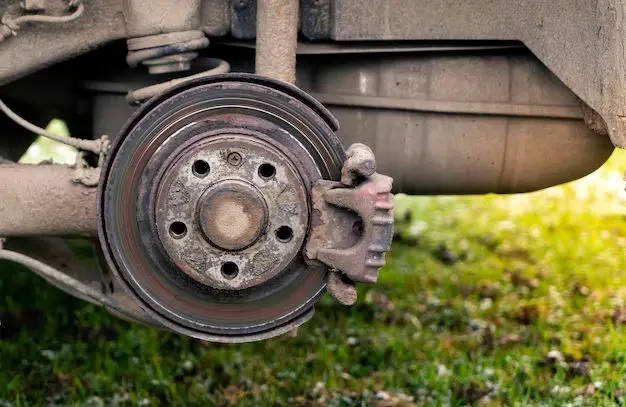Rust on brake calipers is a common occurrence that many car owners will encounter at some point. Brake calipers are a critical part of your vehicle’s braking system and are responsible for squeezing the brake pads against the rotor to slow and stop your vehicle. While a little surface rust may be normal, excessive rusting can lead to sticking calipers, reduced braking power, and costly repairs. In this article, we’ll look at what causes brake calipers to rust, how to identify problematic rust, and steps you can take to prevent and address rusty calipers.
Page Contents
What Causes Brake Calipers to Rust?
There are a few key factors that lead to rusting of brake calipers:
- Exposure to water – Brake calipers are located close to the road surface and are vulnerable to water exposure from rain, puddles, and road spray. Water promotes rust by reacting with the iron in the caliper.
- Road salts and chemicals – In winter climates, road salts and de-icing chemicals accelerate rusting of brake components.
- Lack of use – Infrequently driven vehicles are more prone to rusting calipers and stuck pistons.
- Worn brake components – Worn brake pads and rotors allow more exposure of the caliper piston to water and road grime.
- Low quality materials – Some brake calipers are made with cheaper quality metals more prone to corrosion.
So in areas with wet, cold climates that use salt on the roads, surface rust on brake calipers is fairly common and normal. However, steps should still be taken to control rust and prevent more severe damage.
How to Identify Problematic Brake Caliper Rust
Not all brake caliper rust is a major concern. Here are some ways to identify if rust has become problematic:
- Thick rust buildup – Excessive flaking or caked-on rust indicates advanced corrosion.
- Visible pitting – Small pits and perforations in the caliper metal from rust deterioration.
- Brake fluid leaks – Rust erosion can create cracks and holes causing brake fluid to leak.
- Sticking pistons – Severe rust causes caliper pistons to stick and not retract properly.
- Uneven pad wear – Sticking calipers lead to uneven brake pad wear on that wheel.
- Pulling during braking – Sticking or frozen calipers cause the vehicle to pull to one side when braking.
- Grinding noises – Sticking pistons prevent pads from disengaging fully leading to noises.
- Reduced brake power – Excessive rust can reduce caliper strength leading to brake fade or failure.
Pay close attention for any of these warning signs of problematic rusting. Catching it early helps avoid more extensive repairs.
Preventing Brake Caliper Rust
Consider these best practices to minimize brake caliper rust:
- Regularly wash wheel wells – Frequently spray down wheel wells and brake components to wash away road grime and salts.
- Avoid puddles – When possible, don’t drive through deep puddles which splash rust-causing water on brakes.
- Store vehicle indoors – Avoid outdoor parking which exposes calipers to moisture. Use a garage if available.
- Replace worn components – Don’t delay replacing pads and rotors beyond their service life.
- Lubricate caliper pins – Use silicone brake lubricant on caliper pin bushings when servicing brakes.
- Drive regularly – Infrequent driving promotes rust from lack of use. Take short drives periodically if not commuting regularly.
While you can’t fully prevent brake caliper rust, these tips will minimize its extent and help avoid more harmful rust damage.
Treating and Repairing Rusted Brake Calipers
If you’ve identified problematic rust on your brake calipers, here are some recommended actions:
- Clean and lubricate – For minor surface rust, thoroughly clean calipers then lubricate pins and pistons with silicone grease.
- Use a rust penetrant – For stuck pistons, apply a rust penetrant and allow time to work before attempting to retract the piston.
- Consider DIY repair – Moderate rust can sometimes be repaired by hand sanding or using a wire brush to clean caliper surface. Apply fresh paint to protect.
- Discuss professional repair – For extensive rust damage, replacement of individual caliper parts or the entire caliper assembly may be required. An brake system inspection by a professional mechanic is recommended.
- Replace as needed – Severely corroded and non-functional brake calipers will need replacement. This should be done in sets for an axle.
Addressing rust issues promptly preserves brake system function and avoids further deterioration. Seek help from a professional if rust is beyond what you can handle on your own.
Conclusion
Some surface rust on brake calipers is expected with age and use, especially in wet climates. But excessive rust can seriously impair brake function. Learn to spot problematic levels of rust such as thick buildup, pitting, sticking pistons, and fluid leaks. Taking quick action by cleaning, lubricating, or replacing rusted components will assure safe, reliable braking.
